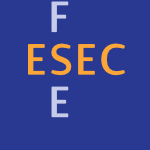Tag #points-to
76 papers:
 ECOOP-2019-Bastani0CAA #analysis #specification
ECOOP-2019-Bastani0CAA #analysis #specification- Eventually Sound Points-To Analysis with Specifications (OB, RS0, LC, SA, AA), p. 28.
 ECOOP-2018-SmaragdakisK #analysis #effectiveness #lazy evaluation
ECOOP-2018-SmaragdakisK #analysis #effectiveness #lazy evaluation- Defensive Points-To Analysis: Effective Soundness via Laziness (YS, GK), p. 28.
 OOPSLA-2018-JeonJO #analysis #data-driven #precise #scalability
OOPSLA-2018-JeonJO #analysis #data-driven #precise #scalability- Precise and scalable points-to analysis via data-driven context tunneling (MJ, SJ, HO), p. 29.
 OOPSLA-2018-RamaKS #analysis #refinement #slicing
OOPSLA-2018-RamaKS #analysis #refinement #slicing- Refinement in object-sensitivity points-to analysis via slicing (GMR, RK, HS), p. 27.
 PLDI-2018-Bastani0AL #learning #specification
PLDI-2018-Bastani0AL #learning #specification- Active learning of points-to specifications (OB, RS0, AA, PL), pp. 678–692.
 CC-2018-ZhaoBS #analysis #parallel
CC-2018-ZhaoBS #analysis #parallel- Parallel sparse flow-sensitive points-to analysis (JZ, MGB, VS), pp. 59–70.
 OOPSLA-2017-GrechS #analysis #named
OOPSLA-2017-GrechS #analysis #named- P/Taint: unified points-to and taint analysis (NG, YS), p. 28.
 OOPSLA-2017-JeongJCO #analysis #context-sensitive grammar #data-driven
OOPSLA-2017-JeongJCO #analysis #context-sensitive grammar #data-driven- Data-driven context-sensitivity for points-to analysis (SJ, MJ, SDC, HO), p. 28.
 PLDI-2017-TanLX #analysis #automaton #modelling #performance #precise
PLDI-2017-TanLX #analysis #automaton #modelling #performance #precise- Efficient and precise points-to analysis: modeling the heap by merging equivalent automata (TT0, YL0, JX), pp. 278–291.
 SAS-2016-BalatsourasS #analysis #c #c++
SAS-2016-BalatsourasS #analysis #c #c++- Structure-Sensitive Points-To Analysis for C and C++ (GB, YS), pp. 84–104.
 SAS-2016-GharatKM #analysis #graph #using
SAS-2016-GharatKM #analysis #graph #using- Flow- and Context-Sensitive Points-To Analysis Using Generalized Points-To Graphs (PMG, UPK, AM), pp. 212–236.
 OOPSLA-2015-DietrichHS #analysis #java
OOPSLA-2015-DietrichHS #analysis #java- Giga-scale exhaustive points-to analysis for Java in under a minute (JD, NH, BS), pp. 535–551.
 CC-2015-AllenSK #analysis #scalability #staged
CC-2015-AllenSK #analysis #scalability #staged- Staged Points-to Analysis for Large Code Bases (NA, BS, PK), pp. 131–150.
 SEKE-2014-WanZWS #analysis #graph #performance
SEKE-2014-WanZWS #analysis #graph #performance- Efficient Points-To Analysis for Partial Call Graph Construction (ZW, BZ, YW, YS), pp. 416–421.
 ECOOP-2014-WeiR #analysis #behaviour #javascript
ECOOP-2014-WeiR #analysis #behaviour #javascript- State-Sensitive Points-to Analysis for the Dynamic Behavior of JavaScript Objects (SW, BGR), pp. 1–26.
 ISMM-2014-RatnakarN #analysis #constraints #graph #performance
ISMM-2014-RatnakarN #analysis #constraints #graph #performance- Push-pull constraint graph for efficient points-to analysis (BR, RN), pp. 25–33.
 VMCAI-2014-Fu #abstract domain #analysis #java #scalability
VMCAI-2014-Fu #abstract domain #analysis #java #scalability- Modularly Combining Numeric Abstract Domains with Points-to Analysis, and a Scalable Static Numeric Analyzer for Java (ZF), pp. 282–301.
 OOPSLA-2013-SmaragdakisBK #analysis #preprocessor
OOPSLA-2013-SmaragdakisBK #analysis #preprocessor- Set-based pre-processing for points-to analysis (YS, GB, GK), pp. 253–270.
 PLDI-2013-KastrinisS #analysis #context-sensitive grammar #hybrid
PLDI-2013-KastrinisS #analysis #context-sensitive grammar #hybrid- Hybrid context-sensitivity for points-to analysis (GK, YS), pp. 423–434.
 SAC-2013-CiraciV #code generation
SAC-2013-CiraciV #code generation- Exploiting points-to maps for de-/serialization code generation (SC, OV), pp. 1712–1719.
 CC-2013-KastrinisS #analysis #effectiveness #exception #java #performance
CC-2013-KastrinisS #analysis #effectiveness #exception #java #performance- Efficient and Effective Handling of Exceptions in Java Points-to Analysis (GK, YS), pp. 41–60.
 CC-2013-LuSXX #analysis #incremental
CC-2013-LuSXX #analysis #incremental- An Incremental Points-to Analysis with CFL-Reachability (YL, LS, XX, JX), pp. 61–81.
 SCAM-2012-GutzmannLL #analysis #framework
SCAM-2012-GutzmannLL #analysis #framework- Collections Frameworks for Points-To Analysis (TG, JL, WL), pp. 4–13.
 ECOOP-2012-SridharanDCST #analysis #correlation #javascript
ECOOP-2012-SridharanDCST #analysis #correlation #javascript- Correlation Tracking for Points-To Analysis of JavaScript (MS, JD, SC, MS, FT), pp. 435–458.
 ASE-2012-IbrahimGHA #ambiguity #analysis #kernel #operating system #using
ASE-2012-IbrahimGHA #ambiguity #analysis #kernel #operating system #using- Supporting operating system kernel data disambiguation using points-to analysis (ASI, JG, JHHH, MA), pp. 234–237.
 ASE-2012-Shang0X #analysis #experience #incremental #performance #precise #summary
ASE-2012-Shang0X #analysis #experience #incremental #performance #precise #summary- Fast and precise points-to analysis with incremental CFL-reachability summarisation: preliminary experience (LS, YL, JX), pp. 270–273.
 CC-2012-PuttaN #analysis #parallel
CC-2012-PuttaN #analysis #parallel- Parallel Replication-Based Points-To Analysis (SP, RN), pp. 61–80.
 CGO-2012-ShangXX #analysis #on-demand
CGO-2012-ShangXX #analysis #on-demand- On-demand dynamic summary-based points-to analysis (LS, XX, JX), pp. 264–274.
 ISMM-2012-Nasre #analysis #constraints #graph #performance
ISMM-2012-Nasre #analysis #constraints #graph #performance- Exploiting the structure of the constraint graph for efficient points-to analysis (RN), pp. 121–132.
 PPoPP-2012-Mendez-LojoBP #analysis #gpu #implementation
PPoPP-2012-Mendez-LojoBP #analysis #gpu #implementation- A GPU implementation of inclusion-based points-to analysis (MML, MB, KP), pp. 107–116.
 POPL-2011-LhotakC #analysis #performance
POPL-2011-LhotakC #analysis #performance- Points-to analysis with efficient strong updates (OL, KCAC), pp. 3–16.
 ESEC-FSE-2011-LiCK #analysis #performance #using
ESEC-FSE-2011-LiCK #analysis #performance #using- Boosting the performance of flow-sensitive points-to analysis using value flow (LL, CC, NK), pp. 343–353.
 SAC-2011-GutzmannLL #analysis
SAC-2011-GutzmannLL #analysis- Feedback-driven points-to analysis (TG, JL, WL), pp. 1341–1342.
 CC-2011-SunZC #analysis #java #probability
CC-2011-SunZC #analysis #java #probability- Probabilistic Points-to Analysis for Java (QS, JZ, YC), pp. 62–81.
 CGO-2011-NasreG #analysis #constraints #evaluation #performance
CGO-2011-NasreG #analysis #constraints #evaluation #performance- Prioritizing constraint evaluation for efficient points-to analysis (RN, RG), pp. 267–276.
 ISSTA-2011-XiaoZ #analysis #encoding #geometry #java #performance
ISSTA-2011-XiaoZ #analysis #encoding #geometry #java #performance- Geometric encoding: forging the high performance context sensitive points-to analysis for Java (XX, CZ), pp. 188–198.
 OOPSLA-2010-Mendez-LojoMP #analysis #parallel
OOPSLA-2010-Mendez-LojoMP #analysis #parallel- Parallel inclusion-based points-to analysis (MML, AM, KP), pp. 428–443.
 SAS-2010-NasreG #analysis #equation #linear
SAS-2010-NasreG #analysis #equation #linear- Points-to Analysis as a System of Linear Equations (RN, RG), pp. 422–438.
 SCAM-2009-GutzmannKLL #analysis #towards
SCAM-2009-GutzmannKLL #analysis #towards- Towards Comparing and Combining Points-to Analyses (TG, AK, JL, WL), pp. 45–54.
 ECOOP-2009-XuRS #alias #analysis #scalability #using
ECOOP-2009-XuRS #alias #analysis #scalability #using- Scaling CFL-Reachability-Based Points-To Analysis Using Context-Sensitive Must-Not-Alias Analysis (G(X, AR, MS), pp. 98–122.
 OOPSLA-2009-BravenboerS #analysis #declarative #specification #strict
OOPSLA-2009-BravenboerS #analysis #declarative #specification #strict- Strictly declarative specification of sophisticated points-to analyses (MB, YS), pp. 243–262.
 SAC-2009-JangC #analysis #javascript
SAC-2009-JangC #analysis #javascript- Points-to analysis for JavaScript (DJ, KMC), pp. 1930–1937.
 ISSTA-2009-BravenboerS #analysis #exception
ISSTA-2009-BravenboerS #analysis #exception- Exception analysis and points-to analysis: better together (MB, YS), pp. 1–12.
 SCAM-2008-LundbergGL #analysis #performance #precise
SCAM-2008-LundbergGL #analysis #performance #precise- Fast and Precise Points-to Analysis (JL, TG, WL), pp. 133–142.
 SCAM-2008-SunZ #analysis
SCAM-2008-SunZ #analysis- Aspect-Aware Points-to Analysis (QS, JZ), pp. 143–152.
 ISSTA-2008-XuR #analysis #scalability
ISSTA-2008-XuR #analysis #scalability- Merging equivalent contexts for scalable heap-cloning-based context-sensitive points-to analysis (G(X, AR), pp. 225–236.
 PASTE-2007-Milanova #analysis #java
PASTE-2007-Milanova #analysis #java- Light context-sensitive points-to analysis for java (AM), pp. 25–30.
 SCAM-2007-GutzmannLL #analysis #towards
SCAM-2007-GutzmannLL #analysis #towards- Towards Path-Sensitive Points-to Analysis (TG, JL, WL), pp. 59–68.
 PLDI-2007-LattnerLA #analysis
PLDI-2007-LattnerLA #analysis- Making context-sensitive points-to analysis with heap cloning practical for the real world (CL, AL, VSA), pp. 278–289.
 PLDI-2006-SridharanB #analysis #java
PLDI-2006-SridharanB #analysis #java- Refinement-based context-sensitive points-to analysis for Java (MS, RB), pp. 387–400.
 CC-2006-LhotakH #analysis #question
CC-2006-LhotakH #analysis #question- Context-Sensitive Points-to Analysis: Is It Worth It? (OL, LJH), pp. 47–64.
 OOPSLA-2005-SridharanGSB #analysis #java
OOPSLA-2005-SridharanGSB #analysis #java- Demand-driven points-to analysis for Java (MS, DG, LS, RB), pp. 59–76.
 PPDP-2005-SahaR #analysis #incremental #logic programming #using
PPDP-2005-SahaR #analysis #incremental #logic programming #using- Incremental and demand-driven points-to analysis using logic programming (DS, CRR), pp. 117–128.
 PLDI-2003-BerndlLQHU #analysis #using
PLDI-2003-BerndlLQHU #analysis #using- Points-to analysis using BDDs (MB, OL, FQ, LJH, NU), pp. 103–114.
 CC-2003-LhotakH #analysis #java #scalability #using
CC-2003-LhotakH #analysis #java #scalability #using- Scaling Java Points-to Analysis Using SPARK (OL, LJH), pp. 153–169.
 PPoPP-2003-ChenHHJL #analysis #architecture #compilation #multi #probability #thread
PPoPP-2003-ChenHHJL #analysis #architecture #compilation #multi #probability #thread- Compiler support for speculative multithreading architecture with probabilistic points-to analysis (PSC, MYH, YSH, RDCJ, JKL), pp. 25–36.
 SCAM-J-2001-AndersonBRT02 #set
SCAM-J-2001-AndersonBRT02 #set- Flow insensitive points-to sets (PA, DB, GR, TT), pp. 743–754.
 SAS-2002-WhaleyL #analysis #performance #strict
SAS-2002-WhaleyL #analysis #performance #strict- An Efficient Inclusion-Based Points-To Analysis for Strictly-Typed Languages (JW, MSL), pp. 180–195.
 FSE-2002-BrunsC #analysis
FSE-2002-BrunsC #analysis- Searching for points-to analysis (GB, SC), pp. 61–70.
 FSE-2002-MockACE #slicing
FSE-2002-MockACE #slicing- Improving program slicing with dynamic points-to data (MM, DCA, CC, SJE), pp. 71–80.
 ISSTA-2002-MilanovaRR #analysis #java
ISSTA-2002-MilanovaRR #analysis #java- Parameterized object sensitivity for points-to and side-effect analyses for Java (AM, AR, BGR), pp. 1–11.
 PASTE-2001-LiangPH #analysis #java
PASTE-2001-LiangPH #analysis #java- Extending and evaluating flow-insenstitive and context-insensitive points-to analyses for Java (DL, MP, MJH), pp. 73–79.
 PASTE-2001-MockDCE #analysis #comparison #comprehension #optimisation #set
PASTE-2001-MockDCE #analysis #comparison #comprehension #optimisation #set- Dynamic points-to sets: a comparison with static analyses and potential applications in program understanding and optimization (MM, MD, CC, SJE), pp. 66–72.
 SCAM-2001-AndersonBRT #set
SCAM-2001-AndersonBRT #set- Flow Insensitive Points-To Sets (PA, DB, GR, TT), pp. 81–91.
 OOPSLA-2001-RountevMR #analysis #constraints #java #using
OOPSLA-2001-RountevMR #analysis #constraints #java #using- Points-To Analysis for Java using Annotated Constraints (AR, AM, BGR), pp. 43–55.
 PLDI-2001-GhiyaLS #ambiguity #analysis #c #memory management #on the #source code
PLDI-2001-GhiyaLS #ambiguity #analysis #c #memory management #on the #source code- On the Importance of Points-to Analysis and Other Memory Disambiguation Methods for C Programs (RG, DML, DCS), pp. 47–58.
 CC-2001-RountevR #analysis #library #source code
CC-2001-RountevR #analysis #library #source code- Points-to and Side-Effect Analyses for Programs Built with Precompiled Libraries (AR, BGR), pp. 20–36.
 PLDI-2000-RouhtevC #analysis #scalability
PLDI-2000-RouhtevC #analysis #scalability- Off-line variable substitution for scaling points-to analysis (AR, SC), pp. 47–56.
 SAS-2000-FosterFA #analysis #c #polymorphism
SAS-2000-FosterFA #analysis #c #polymorphism- Polymorphic versus Monomorphic Flow-Insensitive Points-to Analysis for C (JSF, MF, AA), pp. 175–198.
 CSMR-1999-Tonella #analysis #set
CSMR-1999-Tonella #analysis #set- Effects of Different Flow Insensitive Points-to Analyses on DEF/USE Sets (PT), pp. 62–71.
 ESEC-FSE-1999-LiangH #performance #program analysis
ESEC-FSE-1999-LiangH #performance #program analysis- Efficient Points-to Analysis for Whole-Program Analysis (DL, MJH), pp. 199–215.
 WPC-1997-TonellaAFM #analysis #comprehension
WPC-1997-TonellaAFM #analysis #comprehension- Points-to Analysis for Program Understanding (PT, GA, RF, EM), pp. 90–99.
 POPL-1997-ShapiroH #analysis #performance
POPL-1997-ShapiroH #analysis #performance- Fast and Accurate Flow-Insensitive Points-To Analysis (MS, SH), pp. 1–14.
 POPL-1996-Steensgaard #analysis #linear
POPL-1996-Steensgaard #analysis #linear- Points-to Analysis in Almost Linear Time (BS), pp. 32–41.
 CC-1996-Steensgaard #analysis #source code #type inference
CC-1996-Steensgaard #analysis #source code #type inference- Points-to Analysis by Type Inference of Programs with Structures and Unions (BS), pp. 136–150.
 PLDI-1994-EmamiGH #analysis #interprocedural #pointer
PLDI-1994-EmamiGH #analysis #interprocedural #pointer- Context-Sensitive Interprocedural Points-to Analysis in the Presence of Function Pointers (ME, RG, LJH), pp. 242–256.
 ECOOP-2019-Bastani0CAA #analysis #specification
ECOOP-2019-Bastani0CAA #analysis #specification ECOOP-2018-SmaragdakisK #analysis #effectiveness #lazy evaluation
ECOOP-2018-SmaragdakisK #analysis #effectiveness #lazy evaluation OOPSLA-2018-JeonJO #analysis #data-driven #precise #scalability
OOPSLA-2018-JeonJO #analysis #data-driven #precise #scalability OOPSLA-2018-RamaKS #analysis #refinement #slicing
OOPSLA-2018-RamaKS #analysis #refinement #slicing PLDI-2018-Bastani0AL #learning #specification
PLDI-2018-Bastani0AL #learning #specification CC-2018-ZhaoBS #analysis #parallel
CC-2018-ZhaoBS #analysis #parallel OOPSLA-2017-GrechS #analysis #named
OOPSLA-2017-GrechS #analysis #named OOPSLA-2017-JeongJCO #analysis #context-sensitive grammar #data-driven
OOPSLA-2017-JeongJCO #analysis #context-sensitive grammar #data-driven PLDI-2017-TanLX #analysis #automaton #modelling #performance #precise
PLDI-2017-TanLX #analysis #automaton #modelling #performance #precise SAS-2016-BalatsourasS #analysis #c #c++
SAS-2016-BalatsourasS #analysis #c #c++ SAS-2016-GharatKM #analysis #graph #using
SAS-2016-GharatKM #analysis #graph #using OOPSLA-2015-DietrichHS #analysis #java
OOPSLA-2015-DietrichHS #analysis #java CC-2015-AllenSK #analysis #scalability #staged
CC-2015-AllenSK #analysis #scalability #staged SEKE-2014-WanZWS #analysis #graph #performance
SEKE-2014-WanZWS #analysis #graph #performance ECOOP-2014-WeiR #analysis #behaviour #javascript
ECOOP-2014-WeiR #analysis #behaviour #javascript ISMM-2014-RatnakarN #analysis #constraints #graph #performance
ISMM-2014-RatnakarN #analysis #constraints #graph #performance VMCAI-2014-Fu #abstract domain #analysis #java #scalability
VMCAI-2014-Fu #abstract domain #analysis #java #scalability OOPSLA-2013-SmaragdakisBK #analysis #preprocessor
OOPSLA-2013-SmaragdakisBK #analysis #preprocessor PLDI-2013-KastrinisS #analysis #context-sensitive grammar #hybrid
PLDI-2013-KastrinisS #analysis #context-sensitive grammar #hybrid SAC-2013-CiraciV #code generation
SAC-2013-CiraciV #code generation CC-2013-KastrinisS #analysis #effectiveness #exception #java #performance
CC-2013-KastrinisS #analysis #effectiveness #exception #java #performance CC-2013-LuSXX #analysis #incremental
CC-2013-LuSXX #analysis #incremental SCAM-2012-GutzmannLL #analysis #framework
SCAM-2012-GutzmannLL #analysis #framework ECOOP-2012-SridharanDCST #analysis #correlation #javascript
ECOOP-2012-SridharanDCST #analysis #correlation #javascript ASE-2012-IbrahimGHA #ambiguity #analysis #kernel #operating system #using
ASE-2012-IbrahimGHA #ambiguity #analysis #kernel #operating system #using ASE-2012-Shang0X #analysis #experience #incremental #performance #precise #summary
ASE-2012-Shang0X #analysis #experience #incremental #performance #precise #summary CC-2012-PuttaN #analysis #parallel
CC-2012-PuttaN #analysis #parallel CGO-2012-ShangXX #analysis #on-demand
CGO-2012-ShangXX #analysis #on-demand ISMM-2012-Nasre #analysis #constraints #graph #performance
ISMM-2012-Nasre #analysis #constraints #graph #performance PPoPP-2012-Mendez-LojoBP #analysis #gpu #implementation
PPoPP-2012-Mendez-LojoBP #analysis #gpu #implementation POPL-2011-LhotakC #analysis #performance
POPL-2011-LhotakC #analysis #performance ESEC-FSE-2011-LiCK #analysis #performance #using
ESEC-FSE-2011-LiCK #analysis #performance #using SAC-2011-GutzmannLL #analysis
SAC-2011-GutzmannLL #analysis CC-2011-SunZC #analysis #java #probability
CC-2011-SunZC #analysis #java #probability CGO-2011-NasreG #analysis #constraints #evaluation #performance
CGO-2011-NasreG #analysis #constraints #evaluation #performance ISSTA-2011-XiaoZ #analysis #encoding #geometry #java #performance
ISSTA-2011-XiaoZ #analysis #encoding #geometry #java #performance OOPSLA-2010-Mendez-LojoMP #analysis #parallel
OOPSLA-2010-Mendez-LojoMP #analysis #parallel SAS-2010-NasreG #analysis #equation #linear
SAS-2010-NasreG #analysis #equation #linear SCAM-2009-GutzmannKLL #analysis #towards
SCAM-2009-GutzmannKLL #analysis #towards ECOOP-2009-XuRS #alias #analysis #scalability #using
ECOOP-2009-XuRS #alias #analysis #scalability #using OOPSLA-2009-BravenboerS #analysis #declarative #specification #strict
OOPSLA-2009-BravenboerS #analysis #declarative #specification #strict SAC-2009-JangC #analysis #javascript
SAC-2009-JangC #analysis #javascript ISSTA-2009-BravenboerS #analysis #exception
ISSTA-2009-BravenboerS #analysis #exception SCAM-2008-LundbergGL #analysis #performance #precise
SCAM-2008-LundbergGL #analysis #performance #precise SCAM-2008-SunZ #analysis
SCAM-2008-SunZ #analysis ISSTA-2008-XuR #analysis #scalability
ISSTA-2008-XuR #analysis #scalability PASTE-2007-Milanova #analysis #java
PASTE-2007-Milanova #analysis #java SCAM-2007-GutzmannLL #analysis #towards
SCAM-2007-GutzmannLL #analysis #towards PLDI-2007-LattnerLA #analysis
PLDI-2007-LattnerLA #analysis PLDI-2006-SridharanB #analysis #java
PLDI-2006-SridharanB #analysis #java CC-2006-LhotakH #analysis #question
CC-2006-LhotakH #analysis #question OOPSLA-2005-SridharanGSB #analysis #java
OOPSLA-2005-SridharanGSB #analysis #java PPDP-2005-SahaR #analysis #incremental #logic programming #using
PPDP-2005-SahaR #analysis #incremental #logic programming #using PLDI-2003-BerndlLQHU #analysis #using
PLDI-2003-BerndlLQHU #analysis #using CC-2003-LhotakH #analysis #java #scalability #using
CC-2003-LhotakH #analysis #java #scalability #using PPoPP-2003-ChenHHJL #analysis #architecture #compilation #multi #probability #thread
PPoPP-2003-ChenHHJL #analysis #architecture #compilation #multi #probability #thread SCAM-J-2001-AndersonBRT02 #set
SCAM-J-2001-AndersonBRT02 #set SAS-2002-WhaleyL #analysis #performance #strict
SAS-2002-WhaleyL #analysis #performance #strict FSE-2002-BrunsC #analysis
FSE-2002-BrunsC #analysis FSE-2002-MockACE #slicing
FSE-2002-MockACE #slicing ISSTA-2002-MilanovaRR #analysis #java
ISSTA-2002-MilanovaRR #analysis #java PASTE-2001-LiangPH #analysis #java
PASTE-2001-LiangPH #analysis #java PASTE-2001-MockDCE #analysis #comparison #comprehension #optimisation #set
PASTE-2001-MockDCE #analysis #comparison #comprehension #optimisation #set SCAM-2001-AndersonBRT #set
SCAM-2001-AndersonBRT #set OOPSLA-2001-RountevMR #analysis #constraints #java #using
OOPSLA-2001-RountevMR #analysis #constraints #java #using PLDI-2001-GhiyaLS #ambiguity #analysis #c #memory management #on the #source code
PLDI-2001-GhiyaLS #ambiguity #analysis #c #memory management #on the #source code CC-2001-RountevR #analysis #library #source code
CC-2001-RountevR #analysis #library #source code PLDI-2000-RouhtevC #analysis #scalability
PLDI-2000-RouhtevC #analysis #scalability SAS-2000-FosterFA #analysis #c #polymorphism
SAS-2000-FosterFA #analysis #c #polymorphism CSMR-1999-Tonella #analysis #set
CSMR-1999-Tonella #analysis #set ESEC-FSE-1999-LiangH #performance #program analysis
ESEC-FSE-1999-LiangH #performance #program analysis WPC-1997-TonellaAFM #analysis #comprehension
WPC-1997-TonellaAFM #analysis #comprehension POPL-1997-ShapiroH #analysis #performance
POPL-1997-ShapiroH #analysis #performance POPL-1996-Steensgaard #analysis #linear
POPL-1996-Steensgaard #analysis #linear CC-1996-Steensgaard #analysis #source code #type inference
CC-1996-Steensgaard #analysis #source code #type inference PLDI-1994-EmamiGH #analysis #interprocedural #pointer
PLDI-1994-EmamiGH #analysis #interprocedural #pointer











